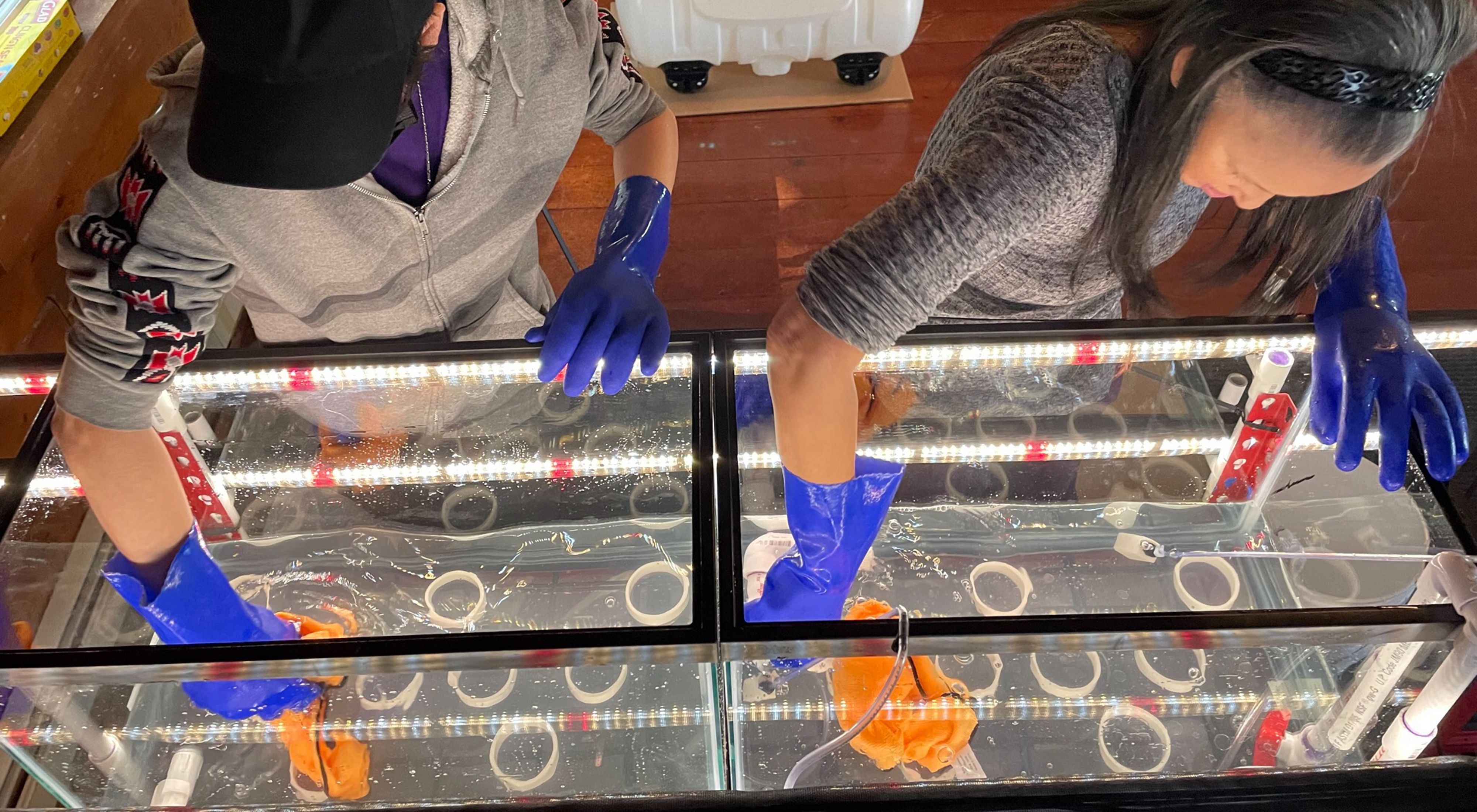Shinnecock Kelp Farmers to Expand Southampton Kelp Farm
Indigenous-led non-profit awarded $75,000 by The Nature Conservancy to capture carbon and reduce nitrogen pollution in Shinnecock Bay
Media Contacts
-
May Yeung
Media Relations Manager
Phone: (347) 387-4250
Email: may.yeung@tnc.org
The Shinnecock Kelp Farmers, a multi-generational, women-led non-profit, is expanding their kelp hatchery and farm in Southampton, NY—the first Indigenous-owned and operated kelp farm on the East Coast. Leveraging knowledge drawn from a more than 10,000-year relationship with the sea and seaweed, the Shinnecock Kelp Farmers intend to expand the hatchery so that kelp can be grown for its many ecologically restorative water-quality, habitat and climate benefits. Eventually, they plan to sustainably harvest the kelp at scale to provide an eco-friendly alternative to conventional fertilizer.
For thousands of years, the Shinnecock Indian Nation has relied on the water for sustenance. As real estate development and population growth rapidly increased in the region around Shinnecock Bay, water quality and biodiversity declined. Studies by The Nature Conservancy and partners found that nitrogen pollution from aging septic systems and fertilizer runoff was at the root of this decline. Empowered by a responsibility to protect the water with which their traditions are intertwined, the Shinnecock Kelp Farmers began work on their kelp farm hatchery in 2020 to revive Shinnecock Bay. By developing a business model that is Indigenous-led from “seed to sale,” the Shinnecock Kelp Farmers also hope to create and sustain green jobs that empower the Shinnecock Tribal community, help restore marine habitat and improve water quality in Shinnecock Bay and beyond.
Within the first season, scallops, clams, sea horses and other species that have experienced precipitous declines in Shinnecock Bay were seen exploring and sheltering in their kelp lines. They’ve shared their findings at conferences in Alaska and, more recently, at the Washington Seaweed Knowledge Symposium. Currently, they are working with GreenWave, the Sisters of Saint Joseph and researchers at the School of Marine & Atmospheric Sciences at Stony Brook University to study how to transport and filter water from the bay to support and scale the hatchery’s work in a sustainable way.
“For years, it was projected that by 2050, our reservation would be underwater due to climate-change-induced sea-level rise. That timeline has since moved up to 2040. Urgent problems exist, and they can no longer be ignored,” says Tela Troge, director of the Shinnecock Kelp Farmers. “When we combine traditional ecological knowledge with cutting-edge science, we see leaps and bounds in what we can do. We are grateful for this support and partnership with The Nature Conservancy, and it is a promising start for what needs to be done, considering the time that we have to do it.”
“We are honored to support and learn from the innovative work of the Shinnecock Kelp Farmers,” said Bill Ulfelder, executive director of The Nature Conservancy in New York. “It’s important to acknowledge and address past injustices inflicted on Indigenous Peoples. When we support and promote Indigenous-led conservation efforts like the Shinnecock Kelp Farmers, we help reduce pollution, improve water quality and promote the health and resilience of all nature, humanity included.”
The benefits of farmed and wild kelp are multifold. Kelp improves local water quality over time by absorbing nitrogen, which currently makes its way to the waters of Long Island through runoff from conventional fertilizers and polluting septic systems. Kelp can also help restore biodiversity in our local ecosystems by providing habitat for wildlife, shielding coastlines from the full force of storms to help reduce erosion and buffering the effects of ocean acidification at a localized level.
Support for the Shinnecock Kelp Farmers is provided through The Nature Conservancy in New York’s Common Ground Fund, which was established to catalyze and enable new and existing conservation work in New York that advances equity, justice and land sovereignty. To learn more about supporting the Shinnecock Kelp Farmers, visit www. shinnecockkelpfarmers.com.
About the Shinnecock Kelp Farmers
The Shinnecock Kelp Farmers are an Indigenous, multi-generational, women-led, independent non-profit focused on creating a hatchery and kelp farm in Shinnecock Bay and beyond to address the climate crisis. The Shinnecock Kelp Farmers strengthen their community by providing a sustainable expression of cultural traditions and increasing regional efforts to improve water quality, climate mitigation and ecosystem function.
Visit www.shinnecockkelpfarmers.com to learn more, and follow @ShinnecockKelp on Facebook, Instagram and Twitter.
The Nature Conservancy is a global conservation organization dedicated to conserving the lands and waters on which all life depends. Guided by science, we create innovative, on-the-ground solutions to our world’s toughest challenges so that nature and people can thrive together. We are tackling climate change, conserving lands, waters and oceans at an unprecedented scale, providing food and water sustainably and helping make cities more sustainable. The Nature Conservancy is working to make a lasting difference around the world in 81 countries and territories (40 by direct conservation impact and 41 through partners) through a collaborative approach that engages local communities, governments, the private sector, and other partners. To learn more, visit nature.org or follow @nature_press on X.
